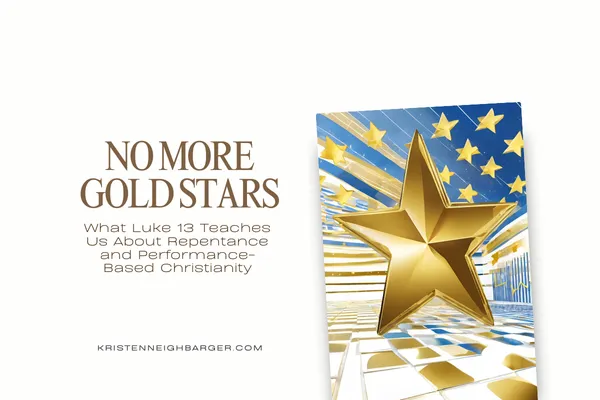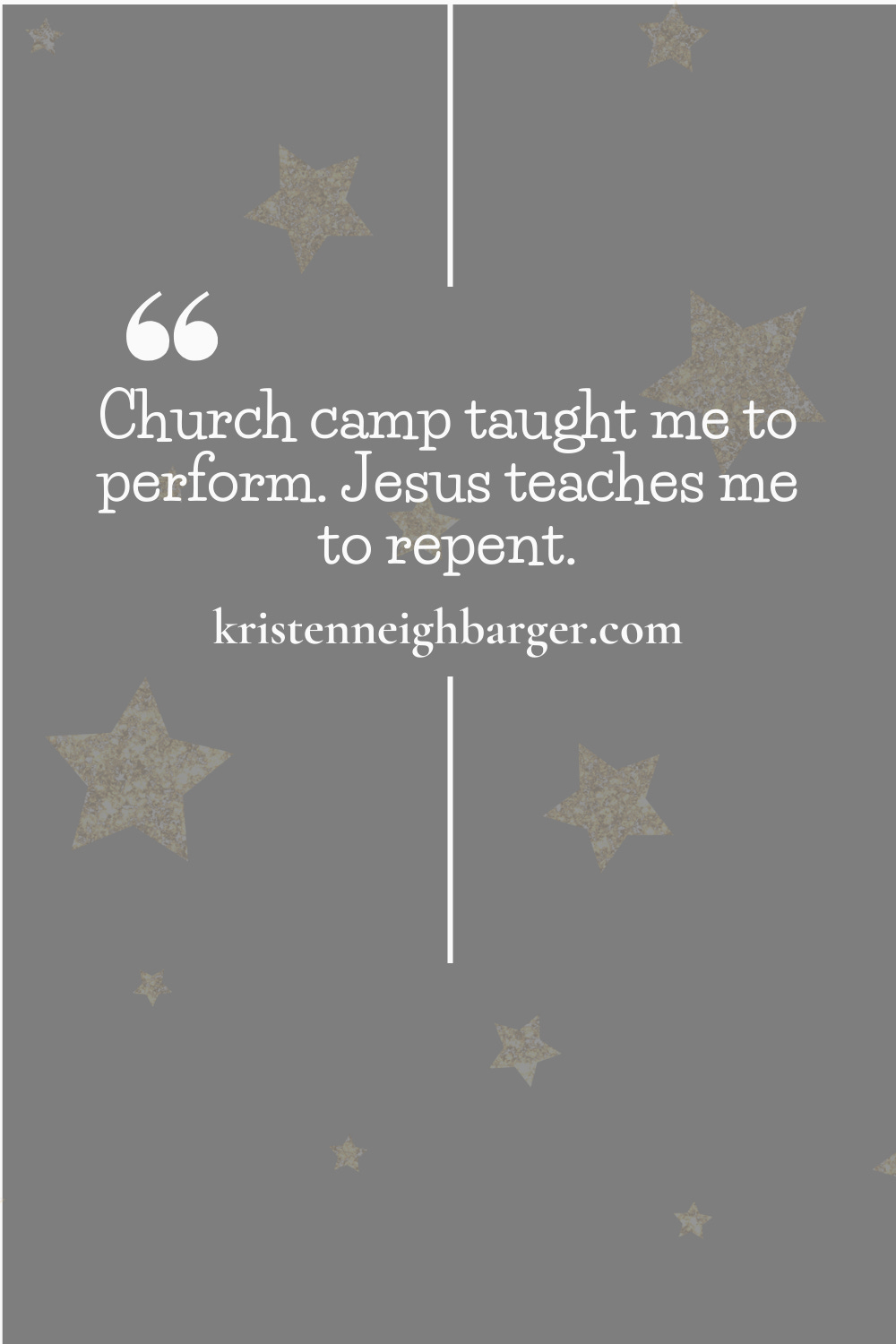
No More Gold Stars: What Luke 13 Teaches Us About Repentance and Performance-Based Christianity
My favorite part of Vacation Bible School as a little girl wasn’t the Kool-Aid, the cookies, the corny songs, or even the Bible stories.
It was the sticker chart.
I loved seeing my name up there in big, bold print with those shiny little gold stars neatly lined up next to it. I went to VBS every day, brought my Bible and friends, and memorized verses with one goal in mind—earn. more. stars.
Then came church camp.

When Faith Became a Competition
If you went to a Christian camp in the ‘80s or ‘90s, chances are you’re still recovering from the trauma of team competitions “for the glory of God.” Everything earned points—cleaning your dorm, making your bed, winning tug-of-war, and yes, memorizing scripture.
When we arrived at camp, we’d get these booklets with one or two pages in the back listing everything we could memorize that week. My goal? Memorize it all. Check every box.
And if I got placed on a team with one or two other gifted memorizers? We were unbeatable.
After all, isn’t that what the Kingdom is about—memorizing the most verses, reciting them on command, and forgetting them five minutes later?
Even now, I cringe.
Performance-Based Christianity Runs Deep
It would be easy to laugh off those childhood memories, but what they reveal about our faith culture is far more sobering.
The deeper issue? We’ve built entire church cultures around performance and appearance-based Christianity.
We’ve taught kids and adults alike to chase perfection, gold stars, and praise. We’ve created a culture that values performance over authenticity, blame over repentance, and spiritualized judgment over honest reflection.
And somewhere along the way, we stopped asking the most important question:
Where is Jesus in any of this?

Luke 13 and the Problem with Spiritualizing Tragedy
As I’ve been studying the book of Luke, I keep coming back to this moment in chapter 13—a moment where Jesus confronts this kind of broken thinking head-on.
Right after speaking about settling disputes with your neighbors, Luke tells us:
“Some of those in the crowd informed Jesus that Pilate had slaughtered some Galilean Jews while they were offering sacrifices at the temple, mixing their blood with the sacrifices they were offering…” (Luke 13:1–2, paraphrased)
Jesus responds:
“Do you think they were worse sinners than all the others? No. And unless you repent, you too will perish.” (Luke 13:3, TPT)
He even brings up another example: a tower falling in Siloam and killing 18 people. Again, he refutes the idea that tragedy is a result of personal sin.
Jesus Debunks a Toxic Theology
There was a prevailing belief at the time that bad things happened to people because of their sin. Jesus shuts that down—not gently, but directly.
And yet, how many of us grew up hearing the same thing?
Not as a consequence of action, but as speculation.
Tragedy strikes and someone asks, “Well, was there some sin in their life?”
This isn't “correlation doesn’t equal causation.”
This is flat-out fiction dressed up in religious language.
We do the same thing when we say things like:
“Their heart must not be in the right place.”
“God must be trying to teach them something.”
“They must be under spiritual attack for a reason.”
Jesus says clearly: that’s not how this works.
And yet, we cling to these narratives because they make us feel secure. If tragedy is caused by someone’s sin, then maybe we can avoid it by being “good enough.”
Spoiler alert: that’s not the gospel. That’s just control dressed in church clothes.
Jesus' Real Message? Fix Yourself.
Here’s what Jesus does say in Luke 13:
“Unless you repent, you too will all perish.” (Luke 13:5)
Translation:
Stop obsessing over other people’s supposed sins and deal with your own.
I love and hate this about Jesus.
Because while I want justice and clarity and maybe a little scoreboard, Jesus gives us a mirror instead.
Mic. Friggin’. Drop.

Repentance Is Not a One-Time Thing
Growing up, we learned the “five-finger plan of salvation” (insert collective sigh). Repentance was one finger in a one-and-done salvation formula.
But that’s not how Jesus talks about it.
Repentance is not a checkbox. It’s a lifelong posture.
It’s laying down the behavior, picking up a new path, and doing it all over again tomorrow.
When we reduce repentance to a one-time act, especially inside a culture obsessed with performance, we kill authenticity. We cover up brokenness to protect our image. And we keep collecting gold stars as if that’s what saves us.
The Fig Tree and the Call to Bear Fruit
Immediately after this conversation, Jesus tells a parable:
A man had a fig tree that hadn’t produced fruit in three years. He told his gardener to cut it down. But the gardener replied, “Let me care for it one more year. Let me dig around it and fertilize it. Then, let’s see if it bears fruit.” (Luke 13:6–9, paraphrased)
This parable is not about punishment. It’s about patience and cultivation.
It’s about what happens when we stop chasing the appearance of fruitfulness and actually become people of substance.
Because here’s the truth:
We can look like beautiful trees—covered in spiritual leaves—but still be completely barren.
No roots. No fruit. No nourishment.
Just performance.
What This Means for You (and Me)
If you, like me, grew up in fundamentalism, this hits hard.
You’ve seen spiritual showmanship that never led to transformation. You’ve probably even performed it yourself.
And now, maybe you’re wondering what real fruit even looks like.
Here’s what Jesus shows us:
God is patient.
Jesus isn’t looking to cut you down.
But he does call you to repent—not just once, but always.
And not so you can feel shame, but so you can bear real fruit.
I don’t see a lot of this in faith spaces, to be honest. I see a lot of people still chasing gold stars, pointing fingers, and spiritualizing pain for control.
It breaks my heart.
But here’s my prayer for you:
Be the tree that produces real fruit, not just one that looks pretty from far away.
Don’t fall for the lie that memorized verses and polished performances are enough.
And when you see barren trees—those whose leaves don’t match their fruit—ask for wisdom to create boundaries.
No more gold stars.
No more spiritual competitions.
No more excuses masquerading as holiness.
Just honesty.
Authenticity.
And the daily decision to turn, repent, and grow.
Let’s start today.

🌿 Looking for fresh inspiration and real connection with fellow writers?
The Hope Story Conference is happening January 29–31, 2026 in Charlotte, North Carolina, and it’s one of my favorite spaces for writers who want to grow in both craft and calling. With keynote speakers like Ruth Chou Simons and Ann Voskamp, you’ll leave refreshed, equipped, and reminded that your story truly matters.
It’s a weekend filled with practical workshops, meaningful community, and encouragement for every stage of the writing journey.
👉 Grab your ticket here: Hope Story Conference
(That’s my affiliate link—thank you for using it to support my work!)
